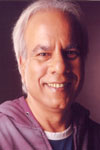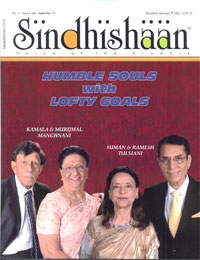AND LIFE GOES ON
By Arun Babani

Revivalism of the Right Kind
Today the religion is being revived and centuries old religious system are being brought into schools and universities. New systems based on ancient knowledge are gaining popularly among the masses which indicates that modern man is in search of answers for his dilemmas, new ways to sort our and get out today’s difficult, terror ridden times.
The manner in which the subject of astrology was made a degree subject and more recently, history books have been altered to give a different direction to the ancient times, shows the urgency that the officials at the helm of affairs feel about it and the ad-hoc manner I which the fundamental religious value are being revived.
While there is no doubt that age old wisdom needs to be brought back to new life, but the question of what exactly is to be brought out in the fresh air what needs to be left in the dusty volumes had to be clearly addressed. For instance, the traditional value of VAIRAGYA (renunciation) seems appropriate, even urgent today. Reviving the idea of Vairagya in these consumerist times, when having more and more seems as a necessary condition for acquiring happiness, will be revival based on reality. Similarly, there are dozens of values in all ancient scriptures of the world which need a similar revamping. Some of them do not fit in their original meaning with modern times. Those values and concepts which are out of tune with today’s context need either to be updated of left out. But what CAN have a new meaning and direction for the lost-in-the-wild modern mind must be revived. For instance, the value of ANATTA (no selfness). In these times when one-upmanship and envy is a way of life, the concept of egolessness cuts the very root of violence prevalent in modern times.
DHAYANA, the practice and knowledge of meditation which is already gaining ground, is another such concept that needs to be revived and made available on a wider scale. Instead of a class in Astrology, a lesson in meditation would serve a grater purpose and address a deeper need in the young minds thirsty for meaning and direction.
Of course, all these areas have to be thoroughly dusted, washed and made to fit the modern perspective. Religion is made for man not vice versa. So, if a particular commandment or idea does not fit with today’s psyche, it can be eliminated. Buddha traveled on a bullock-cart; some of his idea can get uncomfortable in a dizzying speed of a supersonic jet. We can either update them by keeping the essence and changing the layout, or if not, then let them be where they belong. Revival of the past at the cost of the future will never work with the masses who are already tired of the present.
This is the real meaning of Revivalism, to bring back the eternal truth contained in the age old wisdom of the sages, minus the dust it has gathered over a centuries and making it accessible to an average, honest, intelligent and avid audience.
To Hell and Back With Decency
We are expected to love or respect certain type of people it is said to be decent behaviour. For instance everyone loves children. Everyone finds them cute. I think kids are the messiest species on earth. Plus they suck. Two children for an afternoon can make you age. Besides they don’t value anything; costliest of gifts cannot hold their attention for more than ten minutes. If kids are considered like angles, I prefer the later although I haven’t come across any angle so far.
Mahatma Gandhi on the other hand loved the poor and the illiterate whom he called the harijans, the people of God. I find the poor folk rather shabby and loud. They squat anywhere on the road and spit all over the place. It is our middle class guilt bestowed upon us by the Gurus and the Mahatmas that stops us from acknowledging the dread felt by us at the poor. Keeping one’s surroundings clean has nothing to do with riches. It is rather a messy attitude to life that drives the poor people.
This brings me to another category of humans which we are often obliged to love: the youth. Most people would like to believe that the youth is best time of live, when one is beautiful and innocent. I tend to think that the young have always been clumsy and nervous, being uttering unconscious of themselves, their surroundings or anyone else. They live in the ‘l’ major, shallow to the core, this species just has to wear a fashion street t-shirt and the latest foot wear bought on the foot path to feel complete. She’s just in love with herself and naiveté. Vanity thy name is a young lady called Narcicuss. Youth is just a body from tip to toe, so if you notice the colour of her eye ball, you have made her day.
Which brings me to the category diametrically opposite to the teens; the old, or as we wont of calling them, the older generation or better still the Senior Citizens. Although this is one more category of humans which the society wishes to respect or protect or even felicitate, but the facts point the other way. Older people usually get madder by the month. We have a decent medical name for this condition: Senility. Here is one more type that refuses the consider the others point of view and stubbornly refuses to understand what the other means. It is said that riper the fruits sweeter it gets, but alas with us humans it is the other way around. The riper she is the bitter she gets. All these categories do have exceptions but the civilized behaviour, guilt riden and phoney, expects everyone to tolerate or even respect all humans as equals which is s super human task better left for the Mahatmas, which is another category by itself. Avoid them at all costs.
The Sounds of Silence
Some time back, due to power failure, our area walked into complete darkness for about fifteen minutes. For a few moment everyone felt restless and uncomfortable, but as minutes passed and we grew used to the dark, much as one gets used to a smiling stranger, it downed on me that a periodic “flash’ of darkness can be a benediction, having far reaching effects, may be as far as your God’s doors. Yes, a few minutes spent in enforced darkness may open a window to the so far unfamiliar and yet friendly rest.
Reflecting upon this I remember when Ronald Reagan, during his tenure as President of USA, suggested in the Senate that the whole nation, every man, woman, child altogether, should be silent for the two minutes each day, and it was Osho Rajneesh, at that time in Oregon, who immediately proposed to the President to let him take care of those two silent minutes of America. Those he disciples would go to all corners on the USA, to teach people about the silence of these two minutes.
As darkness in the antithesis to light, so silence, “the ocean where the words swim,” is the very ground for many artistic creation, most of all the arts relying totally on words, like literature and drama. Beckett designed an entire theatre experience around silence. In fact any writer worth his salt knows that words are words, he may play around with them, but ill he beings to play the symphony of silence he is not ‘watching out’.
Silence is not just an absence of words; it is a presence that spread out in all direction all at once. Any experience of silence is quite clearly an expensive and deeply satisfying one, involving an expensive and deeply satisfying one, involving an upsurge of energy which was so far involved in mental calculations, usually of the futile beating-about-the-bush kind. With silence it is a touch. With the source.
“A language of which I only know the words and not a pauses is a continuous offence, it is as a caricature of a photographic negative,” says Ivan Illich. And this can be vouched for by any translator of literary works. If he is able to carry only the words to the other language and has no way with the pauses, he fails in the fundamental way; the grammar of silence, with all its depth, is missing from the work.
This is the experience of psychoanalysis too. In a therapy session there is any equal, if not greater, emphasis on ‘reading’ the silence patches, just as the words are interpreted, silence too carry a potential meaning. In music too, a melody is a combination of sounds and silences. A beat, infact, is based on its count of silent gaps.
The words of a novelist or a poet are ‘conceived’ in silence; by taking a plunge in the deep water of silence the words are rescued. This is the silence before the words, the silence in which he wait for the proper moment of the word to be born in to the world.
May practitioners of the craft may not pay much attention to the space and their work would then contain this ‘ignorance’. But like everything valuable silence too is a growth, a growth of being which reaches out to the dark recesses of wordlessness, and it is there that it encounters the word.
That’s the reason why a mechanical silence, merely added to the words doesn’t amount too much; since silence is a growth of that particular person, it comes quite easily into the words, into the gaps between the words, just as each leaf grows into the gaps left by the branches.
The silence of the writer of words in turn needs the silence of the reader: for that space to grow and reach distant corridors. This is the silence of a pure listener. The silence is receptivity, of female passivity. This silence is received, and grows in words have their pronunciations and accents, silence too is multidimensional. There is the silence of indifference of a blocked-out listener, or the silence of choosing the right words, or even the silence of anger.
There is the silence of words where words don’t flow. Then there is the silence beyond words, when words totally evaporate and a silence prevails, immense and immaculate. This is the silence of prayer, when one merges into the whole. Mystics down the ages have shown the way to this silence of communication.
In today’s politics of mass literacy programmes and microphones, and impatience with the darker recesses of silence is understandable. Too many dependence on too many words is the obvious other side of mass communication. When everything else is over, whatever needed to be said or done is said or done with, darkness is the gift, the silence of the eyes that you sit with. It is in the fold of silent moments that you can experience the remains of yourself. It is the silence that nourishes you back to another day of words. Without this silent interlude play out within the gaps of words, now dialogue is possible, no communication is complete, indeed nothing worthwhile is achieved. What can you say about the lovers who can’t cit ad share the silent touch of waves at their feet? Just as without the nights days would be an absurdity, without silence words would be leading away from life, into a slow burdensome death.
Night Bird Watching
I’m a night person. Have always been what started as a temporary necessity, which through habit became a way of life with me. In college, examinations were held at an early morning hour. So all of us in the gang, kept up late, went to the exams, came home by late morning and slept through the day.
Now years later, keeping awake in the night and sleeping in the day is second nature to me.
Like with everything is life, I’ve lost and gained on this account. For instance, I’ve not kept a steady job, which has meant living on meager means and trying my hand at varied things as they come. But on the other hand, I have seen peace beyond description. It depends on what you want from life.
In my researches on night people, I’ve learnt that some people actually prefer to be on duty in the night shift. A cabbie once told me he enjoys the freedom of entering no entry lanes in the night. A watchman prefers the night shift because no one bothers him with complaints and orders. Similarly some policemen prefer night duty to day, because there are no morchas or demonstration in the night, is all a peaceful patrolling.
Research into psychology of the night draws interesting conclusions. For instance, night is believed to be more open and relaxed, which results in friendlier encounters that the daytime. I’ve come to the conclusion that given a choice, more people will opt to be night birds. Its only a necessity that drives their day which leads me to an interesting prediction of a sociologist who believes that the future societies will work in both day and night time. Half the city will sleep while the other half works and enjoys. This way he says, the congestion of the big cities will ease and more people will enjoy better and better spaces with fewer mishaps!
But watch out before you decided to become a night bird. Three requirements must be met before you attempt to turn off a regular income into a freelance one.
ONE, you should be able to either afford your needs or reduce them to suit your pocket.
TWO, you should be able to enjoy your own company for a long stretches of time.
And THREE, which is essential, is that you stock your refrigerator with enough for three meals a night!
Night blindness can be tolerated but night starvation is worse.


